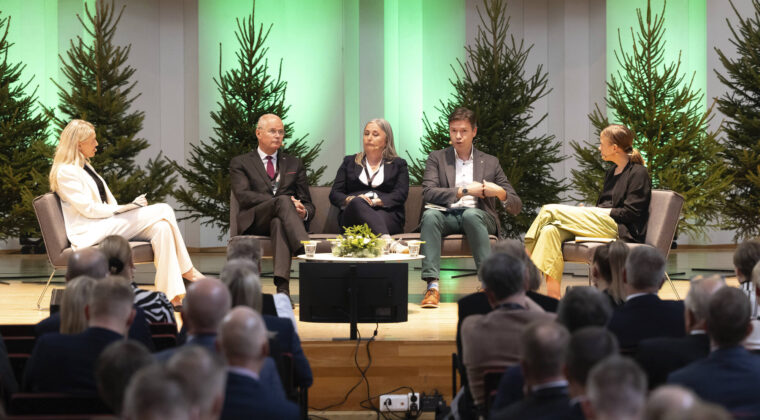
Kouvolan turvallisuuskonferenssi järjestettiin tänä vuonna sähköistyneessä ilmapiirissä. Kun venäläisiä drooneja lensi Naton jäsenmaan Puolan ilmatilassa, tapahtuman teema – maailman uusi (epä)järjestys – tuntui erityisen ajankohtaiselta. Kouvolan kaupungintalolla 12. syyskuuta pidetty konferenssi ei jättänyt kylmäksi, vaan tarjosi harkittua analyysiä kohtaamistamme turvallisuushaasteista.
Puolustusministeri Antti Häkkänen totesi, että tapahtumat kuten Kouvolan turvallisuuskonferenssi ovat nyt tärkeämpiä kuin koskaan, sillä lähes viikoittain tapahtuu huolestuttavia muutoksia turvallisuustilanteessa. Häkkäsen mukaan, samalla kun Venäjä ja Kiina tiivistävät yhteistyötään, länsimaiden on ”tehtävä enemmän” vastatakseen uhkaan.
– Meidän on pidettävä Naton itäinen sivusta turvassa ja kehitettävä suorituskykyämme, Häkkänen sanoi ja peräänkuulutti pitkäjänteistä ja järjestelmällistä lähestymistapaa haasteiden ratkaisemiseksi.
Geopoliittista sumutusta
Pääpuhujana toiminut Elisabeth Braw, kansainvälisesti arvostettu turvallisuusasiantuntija ja kirjailija, joka toimii tällä hetkellä Atlantic Councilin vanhempana tutkijana, puhui Venäjän kyvystä hämärtää totuutta: aina kun Venäjä toimii, ei ole koskaan varmaa näyttöä siitä, että juuri Venäjä olisi vastuussa.
– Tämä on eräänlaista geopoliittista harhauttamista, Braw sanoi ja totesi, että länsi vaikuttaa neuroottiselta – jahtaa varjoja, kun taas Venäjä nauttii kaaoksen kylvämisestä.
Terveiset Ukrainasta
Videoyhteyden kautta konferenssiin osallistunut Oleksandr Kamyshin, Ukrainan presidentin strateginen neuvonantaja, kiitti Suomea tuesta Venäjän aggressiota vastaan. Kamyshinin mukaan Suomi tunnetaan vahvoista ja innovatiivisista teollisuudenaloistaan, ja Ukraina haluaa jakaa tähänastisia ”oppejaan” suomalaisten ystäviensä kanssa.
Teemakeskustelut: epävarmuus, teknologia ja puolustustahto
Puhujien jälkeen konferenssivieraat pääsivät seuraamaan kiinnostavia teemakeskusteluja, joita järjestettiin samanaikaisesti kahdessa tilassa. Ensimmäiset keskustelut käsittelivät aiheita ”Epävarmuus on uusi normaali – miten Suomi varautuu?” ja ”Turvallisuusteknologia murroksessa – mitä uusi aikakausi vaatii?”
”Epävarmuus on uusi normaali” -keskustelussa varautumista tarkasteltiin eri näkökulmista. Hybridiosaamiskeskuksen COI-johtaja Jukka Savolainen totesi, että Suomessa varautuminen tarkoittaa ruuan, suojan, lääkkeiden ja viestinnän saatavuutta kriisiaikana – sekä kansalaisten henkistä kestävyyttä.
”Turvallisuusteknologia murroksessa” -keskustelussa korostettiin, että turvallisuus ei enää perustu pelkästään joukkoihin ja kalustoon, vaan yhä enemmän ohjelmistoihin, järjestelmiin ja teknologiaan pohjautuviin kyvykkyyksiin. Tekoälyn ja kvanttilaskennan kehittyessä avaruus- ja puolustusteknologian kenttä tarjoaa uusia mahdollisuuksia.
Satelliittivalmistaja Iceyen Seppo Aaltonen totesi, että innovaatio on kuin lihas – kun sitä käyttää, se kasvaa. – Hopealuotia ei ole olemassa, hän lisäsi.
Iltapäivän keskustelut: Euroopan puolustus ja puolustustahto
Iltapäivän aikana käsiteltiin teemoja ”Voiko Eurooppa vastata puolustushaasteisiin?” ja ”Miten tuemme puolustustahtoa?”, jotka herättivät vilkasta keskustelua.
Patrian toimitusjohtaja Esa Rautalinko totesi, että Suomi on selvästi Euroopan puolustuksen kärkimaa – ja siksi sillä on myös vastuu edistää kehitystä.
– Puhetta on ollut tarpeeksi, nyt on tekojen aika, Rautalinko sanoi ja huomautti, että esimerkiksi asejärjestelmien yhteensovittamisessa Euroopassa riittää vielä tehtävää.
Nato kriisien keskellä
Ehkäpä päivän kiinnostavin keskustelu käytiin teemalla ”Nato kriisien keskellä – mureneeko vai vahvistuuko liittokunta?”, jonka avasi Maavoimien komentaja, kenraaliluutnantti Pasi Välimäki. Hän kertoi, että Suomen maavoimat ovat niin vahvat, että monet maat haluavat oppia suomalaisilta.
– Saamme paljon pyyntöjä yhteisharjoituksista, Välimäki kertoi.
Paneelikeskustelussa mukana olivat Nordic West Officen toimitusjohtaja Charly Salonius-Pasternak, Ulkopoliittisen instituutin vanhempi tutkija Iro Särkkä, kansanedustaja ja kenraali (evp.) Jarmo Lindberg sekä europarlamentaarikko Li Andersson. Keskustelussa arvioitiin Suomen turvallisuutta Naton aikakaudella.
Paneelissa todettiin, että Euroopan ja Naton vastaus Venäjän viimeisimpään provokaatioon – droonien tunkeutumiseen Puolan ilmatilaan – on ollut riittävän jämäkkä.
– Euroopan unioni on kuin dieselmoottori: käynnistyy hitaasti, mutta vahvistuu matkan varrella, Lindberg kuvaili.
Suomen strateginen asema
Ulkopoliittisen instituutin vanhempi tutkija Iro Särkkä muistutti, että Suomi sijaitsee kolmen keskeisen Nato-teeman risteyksessä Euroopassa: pohjoinen ulottuvuus, etulinjan maat ja Itämeri.
– Euroopan hetki on käsillä, hän totesi.
Kansanedustaja ja Kouvolan kaupunginvaltuuston puheenjohtaja Ville Kaunisto päätti tilaisuuden toteamalla, että Kouvolan turvallisuuskonferenssi on erinomainen alusta turvallisuudesta puhumiselle – ja sen edistämiselle.
– Kun puhutaan järkeä, voidaan myös lisätä turvallisuutta, Kaunisto sanoi.
